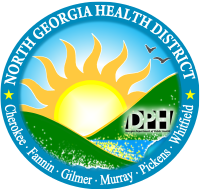- Details
- Written by: Jennifer King, Public Information Officer
- Category: Press Room
Bi-Monthly Updates from our Infectious Disease Department!
Please note the April-May Issue of the North Georgia Health District EPINews, a bi-monthly e-newsletter containing relevant epidemiology updates from our Infectious Disease Department that mainly pertain to the health and well-being of North Georgians.
This issue includes the latest Measles Cases update from the Georgia Department of Public Health, the availability of Back to School Immunizations at our county health departments, free Hepatitis C testing at our health departments for all who are eligible, and shout-outs to award-winning staff members for their outstanding work in immunizations and TB! This issue also addresses upcoming national highlights in which we will be participating in April and May, including STI Awareness Week, National Infant Immunization Week, and Hepatitis Awareness Month. These occasions are excellent opportunities to educate residents on crucial issues and the actions they can take to protect and preserve their health and the health of their families and communities.
Enjoy EPINews! Just tap the graphic below or CLICK HERE and SHARE the link… thank you!
To read our February-March Issue of EPINews, please click here.
- Hits: 3520
- Details
- Written by: Georgia Department of Public Health
- Category: Press Room
NEWS RELEASE
FOR IMMEDIATE RELEASE:
April 11, 2024
DPH Confirms Third Measles Case in 2024
MMR Vaccine is Safe and Effective in Preventing Measles
ATLANTA – The Georgia Department of Public Health (DPH) has confirmed a case of measles in an unvaccinated individual traveling with an international group of students. The individual, who does not live in the United States, is isolated and receiving treatment at a local hospital. DPH is working with the Centers for Disease Control and Prevention (CDC) to identify and contact anyone who may have been exposed to the individual and to prevent further spread of measles.
Measles is very contagious and spreads through the air when an infected person coughs or sneezes. The measles virus can stay in the air for up to 2 hours after an infected person is there so you can become infected by simply being in a room where an infected person once was.
Measles symptoms appear 7 to 14 days after contact with the virus and typically include high fever, cough, runny nose, and watery eyes. Then a rash of tiny, red spots breaks out that usually starts at the head and spreads to the rest of the body.
Measles can be prevented with the MMR (measles, mumps, rubella) vaccine. The vaccine is safe and effective. The Centers for Disease Control and Prevention (CDC) recommends children receive their first dose of MMR vaccine between 12-15 months of age and a second dose between 4-6 years old. More than 95% of people who receive a single dose of MMR will develop immunity to all three viruses. A second dose boosts immunity, typically enhancing protection to 98%.
People with symptoms of measles should contact their healthcare provider immediately. DO NOT go to the doctor’s office, the hospital, or a public health clinic without FIRST calling to let them know about your symptoms. Healthcare providers who suspect measles in a patient should notify public health immediately.
For more information about measles, log on to https://dph.georgia.gov/epidemiology/acute-disease-epidemiology/vaccine-preventable-diseases/measles or https://www.cdc.gov/measles/index.html.
###
- Hits: 3703
- Details
- Written by: Jennifer King
- Category: Press Room
 Brittney Carmichael, Public Health Analyst-Overdose Surveillance and Planning, North Georgia Health District, quoted in Daily Citizen
Brittney Carmichael, Public Health Analyst-Overdose Surveillance and Planning, North Georgia Health District, quoted in Daily Citizen
Read all about it! Our NGHD Community Overdose Response Program was featured in the 2024 Progress Edition of the Dalton Daily Citizen! Go to this link to see what Brittney Carmichael, our dedicated Opioid and Substance Misuse Response Program coordinator, has to say about the effects of the current opioid crisis in this area and the significant prevention efforts that are happening in our communities, along with vital resources: https://bit.ly/DCN_OpioidCrisis-VitalResources_ProgEd.
- Hits: 3043
- Details
- Written by: Jennifer King, Public Information Officer
- Category: Press Room
 Ver opción en Español en la parte superior de esta página
Ver opción en Español en la parte superior de esta página
Our Health Departments in Cherokee, Fannin, Gilmer, Murray, Pickens, and Whitfield counties will be closed from Thursday, March 28th at 1 PM thru all day Friday, March 29th, but we look forward to serving you again on Monday, April 1st! All public health services in North Georgia will be closed on Friday. Find our services on our home page at nghd.org.
- Hits: 3074
- Increase in Measles Cases and Outbreaks in the U.S. and Globally
- North GA TB Coordinator is CDC TB Elimination Champion. World TB Day is March 24!
- Gilmer County Health Department Receives Prestigious Immunization Award
- Our Emergency Preparedness Newsletter, March-April 2024 Issue
- Tips for Staying Safe During Severe Weather this Spring!
- Georgia Preteen Vaccine Awareness Week
- CELEBRATING IBCLC DAY ON MARCH 6TH!
- March is Colorectal Cancer Awareness Month
- Cherokee County Sexual Health Survey
- Introducing our District E-Newsletter: EPI News!



